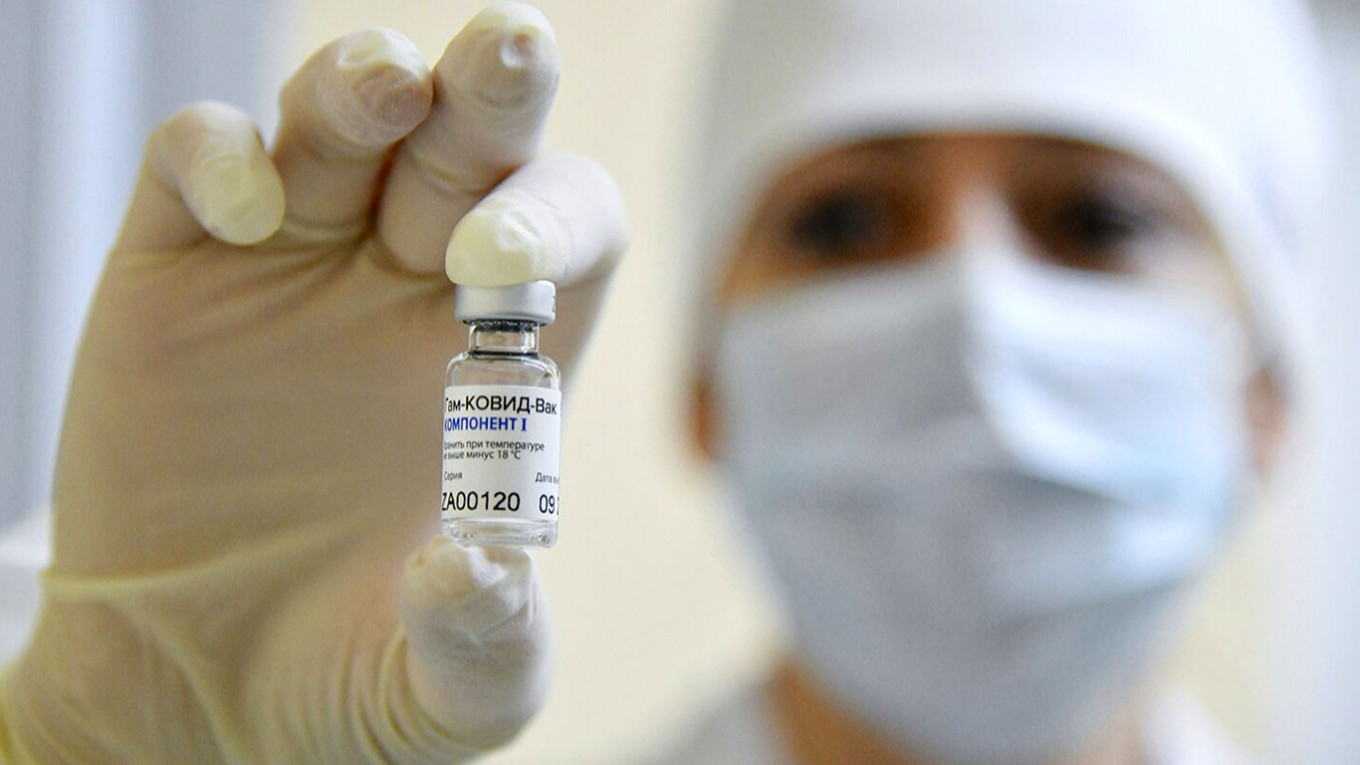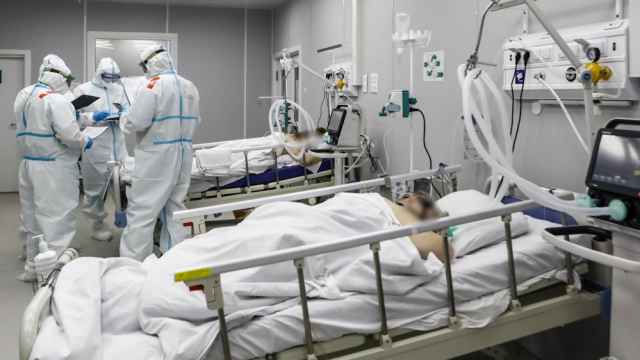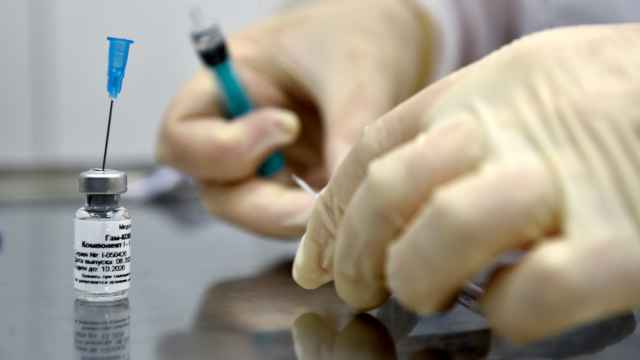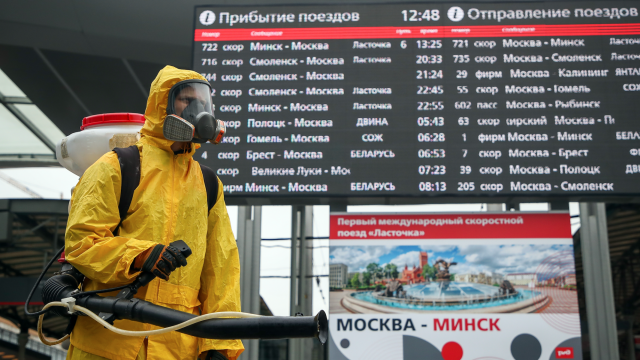A confidential report into Russia’s Sputnik V coronavirus vaccine prepared by its developers to support its authorization around the world, has “severe inconsistencies” and differs from data previously published by Russia on Sputnik V’s clinical trials, a group of independent experts told The Moscow Times.
The 136-page document — obtained by The Moscow Times and titled “Interim Clinical Study Report” — was written in January 2021.
The report does not question the overall safety or efficacy of the vaccine. But the inconsistencies come at a time of renewed scrutiny into Sputnik V clinical trials, as Russia seeks to secure emergency authorization from the WHO and EMA, and its export drive falters amid multiple reports of production delays and late deliveries.
Scientists who reviewed the document found a number of discrepancies between the information it contains and what has previously been disclosed by Sputnik V’s developers, including in a landmark Feb. 2 peer-reviewed report in leading medical journal The Lancet, which found the vaccine to have 91.6% efficacy.
Flaws in the newly-obtained report range from apparent typos and basic numerical errors — such as mislabelled statistics and table headings — to more serious concerns, including unexplained changes in the number of patients in the study.
“Some of this is probably accidental — things which aren’t very severe but are just poor reporting,” said André Gillibert, a biostatistician at university hospital CHU Rouen in France.
“But there are also irregularities and problems that are too severe to be explained away. I think there were problems with the trial that are being hidden,” he added.
His concerns were shared by other scientists who reviewed the report, including Vasiliy Vlassov, an epidemiologist at Moscow’s Higher School of Economics and biologist Konstantin Andreev at Northwestern University. Both have previously highlighted flaws in the reported results of Sputnik V’s clinical trials, and said the new document adds more areas of concern.
“Overall, there are lots of flaws, discrepancies and numerical errors in the report body,” said Andreev. “It is difficult to say whether these indicate a careless proof check or actual data ‘smoothing.’”
Russia has long been accused of rushing Sputnik V’s rollout — which was approved in August 2020 before large-scale medical trials began. The developers at the state-run Gamaleya Research Center have also been criticized for obscuring important data in the results of the trials by refusing to share information with independent scientists and regulatory bodies.
The Russian Direct Investment Fund (RDIF), which is managing the development and production of Sputnik V, did not reply to a request to comment.
Sputnik V has been credited as both safe and highly effective, with almost 75 million doses having been administered in Russia alone. However, concerns still loom in the scientific community about the manner in which clinical trials underpinning the jab were conducted. Unspecified “major” data shortcomings are reported to have been found by the European Medicines Agency (EMA) as part of its review into the vaccine.
This report was drafted in mid-January. It is labelled “confidential property” of the Gamaleya Research Center, and was designed to be shared with “investigators, members of ethics committees, and experts,” according to a statement on the front cover.
The document has been cited by healthcare regulators in both Argentina and Pakistan as having been crucial in their granting of emergency use authorization for Sputnik V. It contains previously unreported information into the vaccine’s clinical trials, including comprehensive data on minor side effects experienced by volunteers as well as information on Covid-19 cases recorded among the volunteers — vital in determining the jab’s efficacy.
Randomization
The scientists who reviewed the document highlighted frequent changes in the number of patients who were said to have been included in the study. In different places in the report the number of patients “randomized” — assigned to either the placebo group or the trial vaccine group for a first dose — is stated as being both 21,977 and 22,022 on the same day, Nov. 24, 2020.
“Within an analysis, the number of patients randomized should be consistent — there should be no difference, not even one digit difference. And here there are several differences,” Gillibert said.
Andreev added: “It’s not clear where the remaining 45 randomized volunteers end up. If those got infected, they would have shifted the efficacy significantly.”
An even larger unexplained discrepancy, the scientists said, comes at another point in the study report, where it is stated that as of Jan. 15, 2021, some 33,760 volunteers had been randomized. That's despite the developers saying they had ceased taking in new volunteers as of Nov. 24, 2020, when only 22,000 had been randomized.
“If enrolment was terminated, why are there 33,760 patients two months later?” said Andreev.
Adverse Events
There are other differences between the data presented in the report and what was published in the flagship The Lancet report into Sputnik V.
In The Lancet article, Sputnik V’s developers said 20 cases of Covid-19 — the study’s first control point for analysis — had been identified by Nov. 18, 2020. But a table of every Covid-19 infection among the volunteers in the study report shows that 20 cases had been reached more than two weeks earlier on Nov. 1, 2020.
The Lancet report and the interim study report claim to be working from the same set of locked data, making such inconsistencies harder to explain, said Gillibert, who noticed the discrepancy.
Select pages from the report, highlighting differences in the number of patients said to have been "randomized" into Sputnik V's clinical trials and a full table of data on side effects experienced by the volunteers.
The new report also contains significantly more information on side effects among volunteers than was disclosed in The Lancet.
Out of a group of 19,866 patients, it reported 16,795 individual side effects — a ratio of 85%. Since many patients reported more than one side effect, this does not reflect the likelihood of an individual Sputnik V recipient experiencing a side effect. But in The Lancet report, the same ratio was just 65%, based on an analysis of only 12,296 patients.
Despite the independent scientists being able to track and spot such inconsistencies in the new report — which formed the basis of Russia’s submissions to regulatory bodies around the world for the vaccine’s approval at the start of 2021 — some believe the developers have tried to downplay or “hide” possible weaknesses in the study.
“Such reports are usually prepared with a thorough hiding of any problems — and without fear of diligent reading,” said HSE’s Vlassov. “It’s intended for an external reader and everything that can be hidden is being hidden.”
“There may have been problems in the conduct of the trial, but it’s very hard to know exactly what was wrong,” said Gillibert. “I can see the inconsistencies, but I cannot explain them.”
“Some might be typos, maybe they copied the wrong figures. But other things are too severe to be explained by only small inadvertencies. There were problems with the trial,” he added.
“Maybe the EMA will find more.”
A Message from The Moscow Times:
Dear readers,
We are facing unprecedented challenges. Russia's Prosecutor General's Office has designated The Moscow Times as an "undesirable" organization, criminalizing our work and putting our staff at risk of prosecution. This follows our earlier unjust labeling as a "foreign agent."
These actions are direct attempts to silence independent journalism in Russia. The authorities claim our work "discredits the decisions of the Russian leadership." We see things differently: we strive to provide accurate, unbiased reporting on Russia.
We, the journalists of The Moscow Times, refuse to be silenced. But to continue our work, we need your help.
Your support, no matter how small, makes a world of difference. If you can, please support us monthly starting from just $2. It's quick to set up, and every contribution makes a significant impact.
By supporting The Moscow Times, you're defending open, independent journalism in the face of repression. Thank you for standing with us.
Remind me later.







